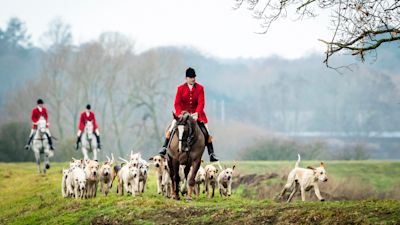What is trail hunting and is it legal?

The police and the Crown Prosecution Service are investigating online seminars hosted by hunting’s governing body, The Hunting Office, ITV News has learned.
Traditional fox hunting - where the animal was chased and killed by dogs - was banned in England and Wales in 2005.
A number of alternative versions of hunting have continued in the wake of the ban, however, and are now the subject of controversy and fierce debate.
So what is the legal situation on the different forms of hunting and who's who in one of the country's most fiercely debated issues?
The variations on fox hunting
Following the ban on the chasing and killing of animals, different variations sprung up to allow the activity to still take place in modified, legal forms.
Drag hunting - a sport that existed before the ban - uses foxhounds to search for a scent laid by a drag pulled on a string.
The activity doesn't involve an animal scent and doesn't involve the pursuit or killing of wild animals.
Trail hunting uses an animal-based scent for the hunt to follow and is the form many hunts have switched to following the 2005 ban.
Groups on each side of the debate differ as to whether the scent is laid using a material laced with something like urine or whether body parts or carcasses are used.
Following the Hunting Act 2004, banning traditional hunts, the practice of trail hunting has been widely adopted.
Is there an issue with trail hunting?
It really depends who you ask.
The League Against Cruel Sport, an animal protection group that helped bring about the ban, says trail hunting is simply a "smokescreen" for tradition hunting still taking place.
The group says the scent is "laid in areas where foxes or hares are likely to be" resulting in live foxes often being chased and killed.
The League says a "trail layer" - the person who lays out the scent for the hunt to follow - does so without notifying those in control of the hounds, allowing the hunt to claim ignorance if an animal does get killed.
It argues trail hunting still results in "out of control" hounds, "trespassing on private land" and, crucially, the killing of animals.
Hunting groups refute these claims.
The Hunting Office - which "aims to promote and protect the interests and values of hunting and the hunting community" - argues trail hunting is a legal practice that simulates traditional hunting.
The group says the trail hunting allows hunts to "retain their infrastructure as well as their hounds, members and activities".
On whether animals are killed as they were during traditional hunts, the Hunting Office admits it is "highly likely" foxes will be seen on a trail hunt.
But the group says if the hounds pick up a live scent: "The huntsman and other members of hunt staff stop the hounds as soon as they are made aware that the hounds are no longer following a trail that has been laid."
The Hunting Office describes critics' claims about trail hunting as "persistent spurious allegations".
Is there a solution?
For the critics of hunting, last year saw a series of successful prosecutions against hunts that were found to have broken the law.
Groups are calling for amendments to the Hunting Act to strengthen it, however, to limit potential grey areas that result in animals still being harmed.
The RSPCA, for example, says the law should include a "tighter definition of hunting" that incorporates "searching for".
It says animal products should be banned when laying trails and that trail hunts should be registered, provide maps of the trails to the police in advance and record instances where foxes have been killed by hounds.
The Hunting Office says groups already "record and keep evidence" on trail laying and insists "files are kept of the day’s activities".
While the Masters of Foxhounds Association (MFHA) - the governing body representing 171 hunting packs in England and Wales and eight in Scotland - says it continues to advise its members on hunting within that law but is campaigning to have it repealed.